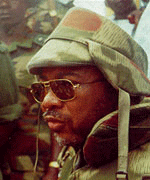
History will not be kind to Mr. Taylor because he deserves its condemnation

History will not be kind to Mr. Taylor because he deserves its condemnation
 |
|
Charles Taylor
|
Lack of Remorse, Shame or Guilt
Mr. Taylor's approach to governance was not seeing Liberians as people, but
only as targets and opportunities. For him, the end always justifies the means
and he let nothing stand in his way. In his statements and speeches leading
up to his departure, he was the victim, the wronged-one, never once admitting
self-culpability, not even admitting mistakes. It was all about how he had
been treated wrongfully.
Shallow Emotions
Several persons who have interacted closely with Mr. Taylor suggest that when
he shows what seem to be warmth, joy, love and compassion it is more feigned
than experienced and always had an ulterior motive. He is said to have been
easily outraged by insignificant matters, yet remained unmoved and cold by
what would upset a normal person. He easily failed to keep his promises, and
never seemed disturbed and even concerned about the country he led, so long
as he was accorded the pomp and circumstances of the presidency.
Incapacity for Love of Country
There is general consensus that Mr. Taylor’s recent profession of love
for Liberia was not genuine. There are reports that he was very harsh in testing
loyalty among his devotees and expected them to feel guilt for their failings.
He expected unconditional surrender to his leadership. Some Liberians argue
that this character trait may explain the murders of several prominent Liberians
such as Jackson F. Doe, Mose Doupou, as well as Samuel Dokie, and why he forced
out former Senator Charkes Brumskine from his leadership role, and seat in
the Senate.
Need for Stimulation
As President, Taylor relished living on the edge. Many Liberians believed
that when things were settling down and returning to normal, Taylor would
make a speech or take some other action that would create a row in the country,
and start a political storm. Verbal outbursts and physical punishments were
said to be routine for his followers.
Callousness/Lack of Empathy
President Taylor was unable to empathize with the pain of his victims, the
people of Liberia. He and his family and friends lived opulently, while the
overwhelming majority of the people lived in poverty, without even electricity
or running water. His statements and policies only showed contempt for the
people's feelings of distress and readily took advantage of them. He adamantly
refused to change his policies and actions as a means of obtaining international
support for the country, even as the international community laid out what
he needed to do to return Liberia into international respectability.
Poor Behavioral Controls/Impulsive Nature
Perhaps the best description of Taylor's presidency is that he believed he
was all-powerful, all-knowing, and entitled to every wish. He had no sense
of personal boundaries, and had no concern for the impact of his actions on
others, or the country, or even the region.
Early Behavior Problems/Juvenile Delinquency
Many persons who went to school with Charles Taylor report that he had a history
of behavioral difficulties, and yet "got by" by conning others.
He is said to have exhibited aberrant behaviors such as the persistent report
that he defecated or urinated into the drinking well of his boarding school,
Ricks Institute.
Irresponsibility/Unreliability
The one compelling attribute about Mr. Taylor’s political career as
it was unleashed in December 1989 until it ended in August 2003, is that it
wrecked the lives and dreams of countless Liberians. Even as he was leaving,
he was oblivious or indifferent to the devastation he has caused. He does
not accept blame for anything, but rather blames others, including President
Bush and the United Nations for his failures.
Lack of Realistic Life Plan/Parasitic Lifestyle
Throughout his presidency, Mr. Taylor made all encompassing promises for the
future that he failed to achieve or to do what he needed to do make them possible.
There was a great contrast between his opulent lifestyle and the citizen's
impoverishment. He was supported by gifts and donations from his followers,
the Government treasury, his business partners, and others who were pressured
to give through fear and guilt. The whole purpose of his presidency was to
support his parasitic lifestyle.
Criminal or Entrepreneurial Versatility
Taylor's governance of Liberia was no more than a criminal enterprise. Likewise,
the facts underlying the allegations contained in the indictment in Sierra
Leone appear to be related to nothing more than facilitating a criminal empire
throughout West Africa.
As a leader, Charles Taylor exhibited many of the behavioral characteristics
of a sociopath--an outstanding ability to charm and seduce people and seamlessly
carryout predatory activities. Since they appear apparently normal, sociopaths
are not easily recognizable as deviant or disturbed. Although only a trained
professional could make a diagnosis of Mr. Taylor's mental condition, it is
important for us to be able to recognize a political sociopath in order to
avoid or resist their assumption of leadership in Liberia again. History will
judge Charles Taylor harshly, just like he ought to be judged.
